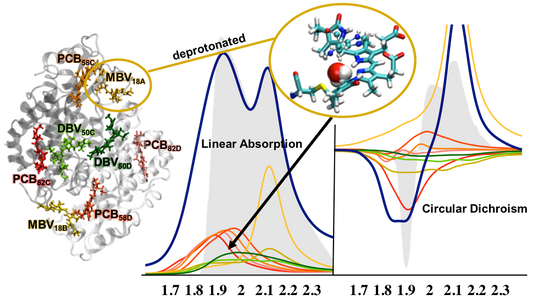Prof. David Coker Awarded $435,000 NSF Grant
 Congratulations to Professor David Coker for receiving a National Science Foundation Grant (NSF) totally $435,000. This project will fund Dr. Coker and his team’s research into two areas. The first project will focus on extending, first principles, excited state quantum chemical methods and conformational sampling techniques to compute the distributions of parameters in models of the biological light harvesting systems that have received much attention in recent ultrafast nonlinear spectroscopy studies. Such models are usually employed to interpret the results of these averaged experiments. These best-fit, average models have many parameters that can be difficult to estimate and they are not generally unique, often leading to ambiguous interpretation. The theoretical methods being developed by the Coker group, however, enable detailed analysis of fluctuations underlying the average and the sampling of an ensemble of unique models that include, for example, highly performing structural outliers whose characteristics will give important understanding for optimal design, rather than mean behavior. In the second project, dissipative quantum dynamical methods are employed to compute spectroscopic properties and study relaxation processes including energy transport and charge separation using the ensembles of computed models. Preliminary work on these projects was featured in a recent publication in the Journal of the American Chemical Society.[1]
Congratulations to Professor David Coker for receiving a National Science Foundation Grant (NSF) totally $435,000. This project will fund Dr. Coker and his team’s research into two areas. The first project will focus on extending, first principles, excited state quantum chemical methods and conformational sampling techniques to compute the distributions of parameters in models of the biological light harvesting systems that have received much attention in recent ultrafast nonlinear spectroscopy studies. Such models are usually employed to interpret the results of these averaged experiments. These best-fit, average models have many parameters that can be difficult to estimate and they are not generally unique, often leading to ambiguous interpretation. The theoretical methods being developed by the Coker group, however, enable detailed analysis of fluctuations underlying the average and the sampling of an ensemble of unique models that include, for example, highly performing structural outliers whose characteristics will give important understanding for optimal design, rather than mean behavior. In the second project, dissipative quantum dynamical methods are employed to compute spectroscopic properties and study relaxation processes including energy transport and charge separation using the ensembles of computed models. Preliminary work on these projects was featured in a recent publication in the Journal of the American Chemical Society.[1]
Dr. Coker is a Professor of Theoretical and Physical Chemistry and is the Director for BU’s Center for Computational Science (BU CCS). The Coker Group focus their research the development of new theoretical and computational methods to explore how electronic and vibrational excitation of reactant molecules in different environments can influence the outcome of chemical reactions of these molecules. Because electronic and vibrational relaxation of excited reactants is fundamentally quantum mechanical in nature, the methods they use must accurately describe the transfer of energy between the classical environment and the quantal reactive system.
[1] “First-Principles Models for Biological Light-Harvesting: Phycobiliprotein Complexes from Cryptophyte Algae”, M.K. Lee, K. Bravaya, and D.F. Coker, J. Am. Chem. Soc., 2017, 139 (23), pp 7803–7814